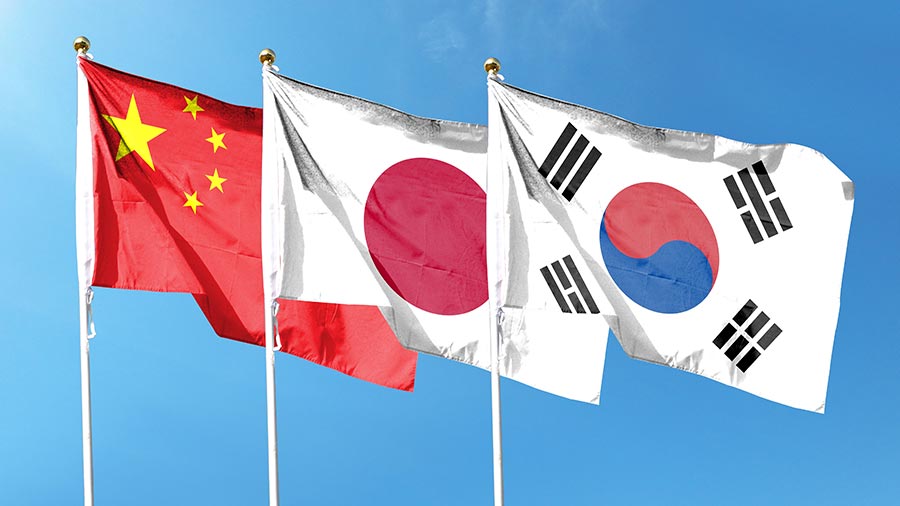New Delhi With Seoul hosting this time’s China- South Korea- Japan Trilateral Summit, suggestions are that the three countries are trying to bring down temperatures in that part of the world. Chinese Premier Li Qiang, Japanese Prime Minister Fumio Kishida and South Korean President Yoon Sook Yeol attended the meeting following which a common protestation was issued. The 38- point protestation called for peace and stability in Northeast Asia and the Korean Peninsula. During the meeting, China also prompted Japan and South Korea to reject protectionism and uphold free trade. This was the ninth trilateral peak between China, Japan and South Korea and the first since 2019.
So, what was the significance of this time’s peak?
According to K Yhome, a Fellow at the Shillong- grounded Asian convergence suppose tank, the common protestation suggests that the three countries on May 28 are exploring ways to manage their relations in a way that’s salutary for the parties involved and also the wider region.
“ This could be a politic move by China and also Japan to bring some normality in the region, ” Yhome told ETV Bharat.
China is in conflict with several Southeast Asian nations in the South China Sea with Taiwan over the islet nation’s independence and with Japan on claims over the Senkaku islets in the East China Sea. Meanwhile, pressures continue in the Korean Peninsula with North Korea’s conduct hanging both South Korea and Japan.
pertaining to the common protestation issued following the trilateral peak, Yhome said that the compass of cooperation the three countries talk about moment is relatively elaborate. “ We need to read this in the environment of the adding US- China contest in the Indo- Pacific, ” he said.
The US is leading several enterprise, including the quadrangle, which also includes India, Japan and Australia in the face of China’s combativeness in the Indo- Pacific. lately, a new alliance called the team comprising the US, Australia, Japan and the Philippines was formed to maintain peace and security in the region.
still, according to Yhome, through the trilateral peak, Tokyo might be trying to shoot a signal to Beijing that whatever Japan is for security in the region doing isn’t inescapably targeting China.
“ Tokyo is saying that it’s willing to work with Beijing for security in the region, ” he said.
For China, the intent of this peak could be the Taiwan issue. New Taiwanese President Lai Ching Te has been decreasingly oral about his country defending its independence from China. Beijing, too, conducted a series of nonmilitary drills around Taiwan after the new government assumed power in Taipei.
“ Also, because of the US ’ adding part in Taiwan, it’s China’s way of saying that it isn’t interested in conflict in the region, ” Yhome said. “ Both Japan and South Korea are crucial actors in that part of the world. ”
Meanwhile, the Koreans are also bothered about the developments in the Taiwan woe. According to Yhome, South Korea hosted the peak to bring down the heat in the region. Seoul wants a collaborative frame and doesn’t want to see conflicts in the region.
In December last time, South Korea unveiled a new Indo- Pacific strategy that spectators say aligns with the strategies of the quadrangle. In its new strategy, South Korea pledged to bolster the indigenous rules- grounded order to cover freedom, republic and mortal rights. The document expands on President Yoon’s former pledges to accept lesser responsibility for defending popular principles and is harmonious with the public security strategies of the US and its abettors . still, it held back from unambiguously defining the Chinese trouble in the region to the same extent that Washington, New Delhi, Tokyo and Canberra have.
still, despite being a formal supporter of the US under the 1953 Mutual Defence Treaty, South Korea has deep- embedded profitable liaison with China, which is its largest trading mate with a Free Trade Agreement( FTA) in place since 2015.
At the end of it all, Yhome said, the common protestation is just a piece of document. “ We’ll have to stay and see how it works out, ” he said.
What are the counteraccusations of the trilateral peak for India?
The trilateral alliance has counteraccusations for maritime security in the Indo- Pacific region, a crucial area of interest for India. Collaboration among China, South Korea and Japan in maritime sphere mindfulness,anti-piracy sweats and freedom of navigation operations influences the security terrain in the region. India’s strategic interests are nearly tied to maintaining a free, open, and secure Indo- Pacific.
India maintains strong bilateral relations with Japan and South Korea, while its relationship with China is more complex and pronounced by competition and cooperation.

still, according to Yhome, though the common protestation addresses about indigenous peace, it doesn’t mean that it’ll have any direct counteraccusations on India- China bilateral ties. India, too, has two trilateral alliances in place – one with the US and Japan and another with Russia and China called RIC( Russia, India, and China).
“ moment’s global issues are driven by similarmini-laterals, ” Yhome explained. “ The RIC trilateral alliance does n’t mean targeting Japan. also, the India- US- Japan trilateral alliance does n’t mean targeting China. ”
At the end of it all however, the trilateral alliance between China, Japan and South Korea won’t change the positions of India and Japan when it comes to ties with the US and the quadrangle in the Indo- Pacific.
